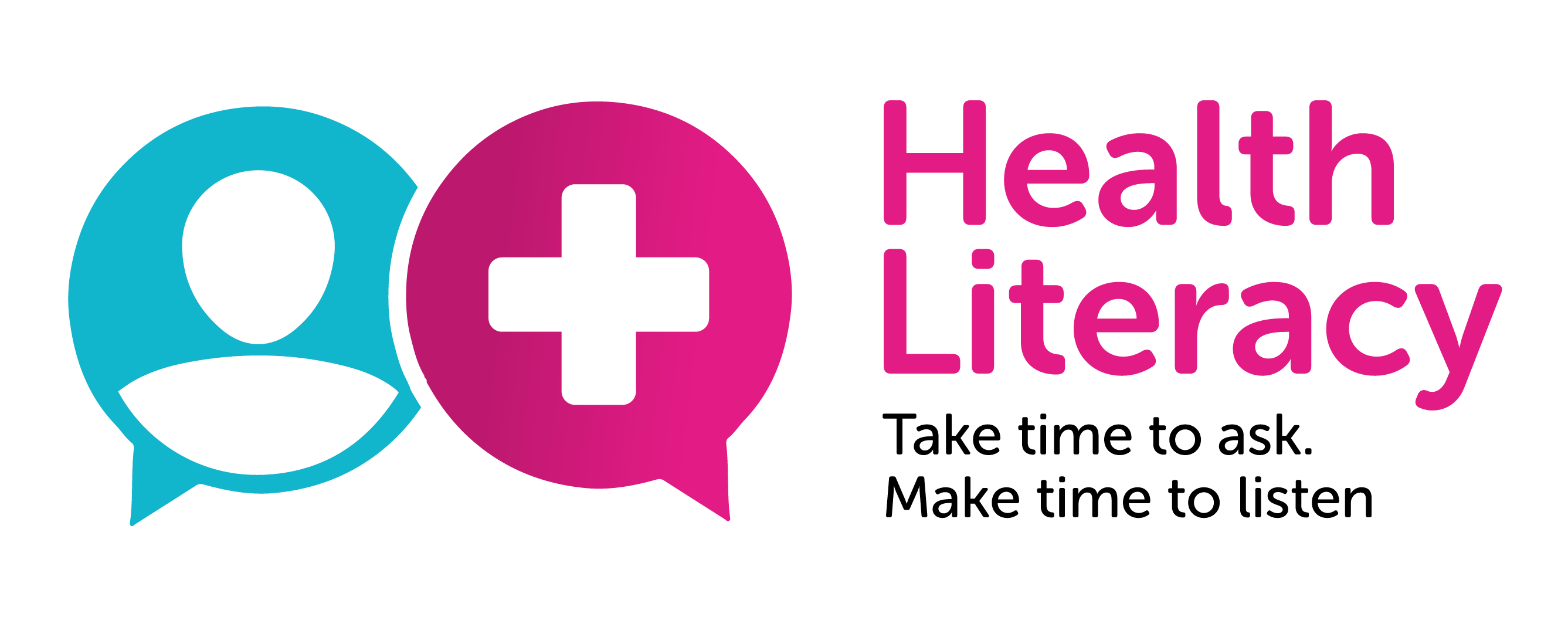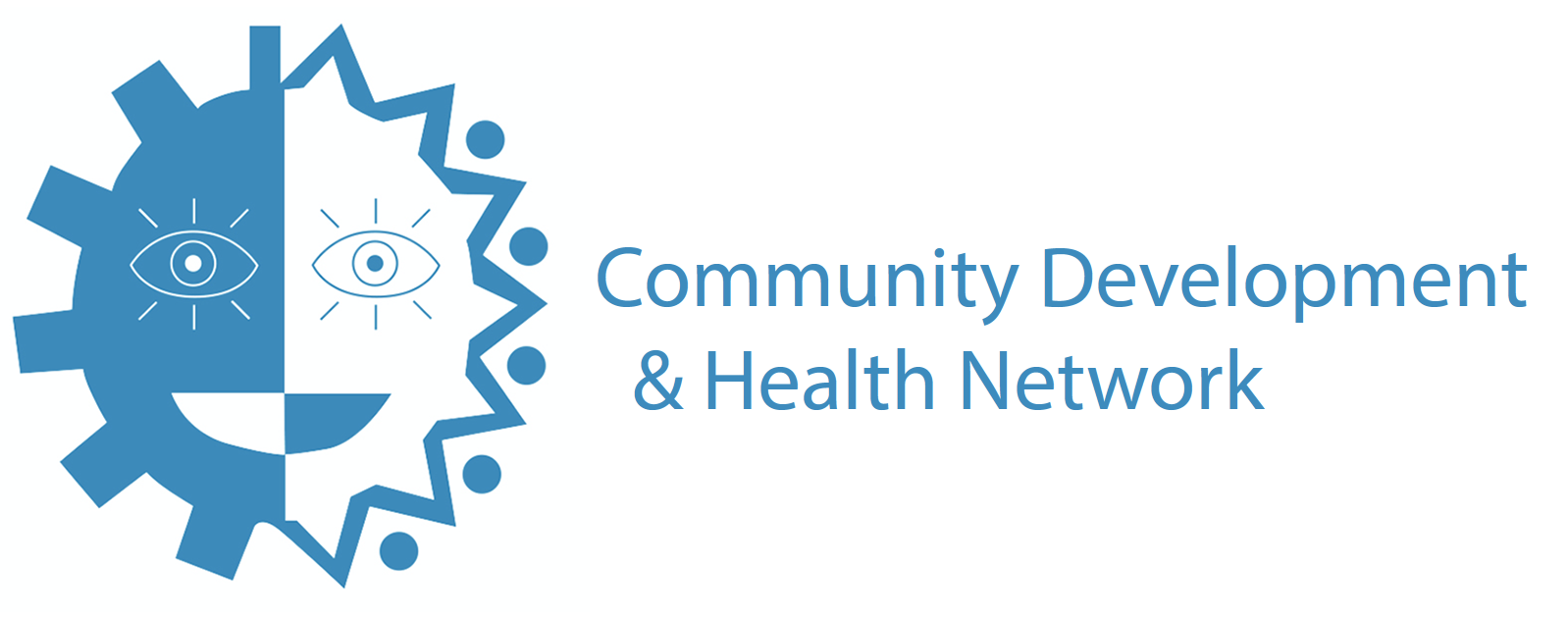
Health Literacy
'Health literacy is about our knowledge, skills, understanding and confidence to be able to use health and care information and services to make good health decisions.'
Northern Health and Social Care Trust Service Users (2019)
This logo, definition and tagline were co-produced by service users in the Northern Health and Social Care Trust (NHSCT). The logo has two parts representing individuals and communities (person), health care providers and policy (health cross).
Why is Health Literacy Important?
Health literacy has been recognised as a social determinant of health. Anyone can have low health literacy, however disadvantaged groups are more likely to have low health literacy. Research shows people with higher levels of health literacy feel better equipped to be active partners in their health, navigate healthcare systems and advocate to political leaders and policymakers. According to research, healthcare professionals should be more aware of health literacy, including the concept and identify those who have poor medication literacy. Improving health literacy can reduce health inequalities and improve patient health outcomes.
CDHN recently completed research into medication safety and the social determinants of health. Health literacy was a dominant theme in the research findings, highlighting that people have varying abilities in assessing, understanding, and using information about their medication. This is influenced by family and friends, community networks, the wider media and health. We also found that social care staff can often presume people have the correct knowledge and understanding to take their medication as prescribed.
The regional Making Life Better Framework for Public Health includes a commitment under Theme 3 to 'empower people to make healthier choices and informed decisions about their health by improving health literacy'. Health literacy is also highlighted by a number of Councils under community planning as a social determinant of health, as a means of addressing health inequalities in line with prevention commitments under Health and Wellbeing 2026: Delivering Together.
CDHN Health Literacy Work
Aim
To increase awareness and improve knowledge and understanding of health literacy so that:
- People have confidence when using health information and services to feel better equipped to make health decisions.
- Those who support people with health and social issues have a better understanding of people’s circumstances so they can provide the most effective and appropriate advice and help.
CDHN Health Literacy Training
Bespoke Training
We offer bespoke health literacy training (online or face to face), this is a cost-effective and convenient solution designed to meet your specific training needs. We will work closely with you to clarify your learning objectives and tailor the course to your needs / the people that you support.
- Health and social care - tailored for different professions e.g., pharmacy, dentistry, GPs, social work or for support staff e.g., receptionists or GP practice managers.
- Those who work/volunteer in the community - tailored to different audiences e.g., younger people, people from the travelling community, and people with disabilities.
Health literacy training topics include:
- Understanding health literacy
- Health literacy and health inequalities
- Exploring low health literacy
- Health literacy and engagement
- Developing health literate written information
- Health literacy communication skills & tools and techniques
- Getting the most out of your appointment with your health professional (including virtual consultations)
- Navigating the health and social care system and choosing the right service at the right time
- Finding credible health information and identifying misinformation and fake news
- Actions to improve health literacy (How can I make a difference)
We have delivered health literacy training to GP Federations, GP Multi-Disciplinary Teams, Health and Social Care Trusts and Community and Voluntary sector organisations and we developed an online e-Learning module for Northern Ireland Centre for Pharmacy and Learning Development (NICPLD).
Feedback
“I was quite unsure as to what Health Literacy really meant beforehand but the training shone a complete light for me. Going forward I will certainly be more considerate as to peoples' possible needs”
- Community training participant
“Delighted that this training took place for all MDT staff in GP settings. Thinking of how we communicate and using the tools and techniques learnt during the session, this will ultimately have a positive outcome for our patients and improve overall patient experience. I feel being more health literate will also improve staff experience and morale”
- Health and social care training participant
Health Literacy Resources
The Western Health Literacy Delivery Partnership have developed a number of Health Literacy resources:
The Northern Health and Social Care Trust has developed a series of Health Literacy Resources.
CDHN produced two videos with Northern Ireland Centre for Pharmacy Learning and Development (NICPLD) to illustrate health literacy techniques in a community pharmacy setting. These videos are used in NICPLD and CDHN health literacy training:
- The Teach Back method - This is a useful way to confirm that the information you provide is being understood by getting people to ‘teach back’ what has been discussed and what instruction has been given.
- Chunk and Check technique - This involves breaking down the information that you need to discuss and that you need the person to understand into smaller, more manageable chunks. In between each ‘chunk’, methods such as teach back to ‘check’ for understanding before moving on are useful.
Influence
- CDHN is a member of the Regional Health Literacy Forum, the Western Health Literacy Delivery Partnership and Belfast Healthy Cities Health Literacy Working Group.
- We have given presentations about health literacy work at a number of conferences and seminars and have contributed to policy papers and journals.
If you would like to find out more about our work on health literacy or health literacy training, contact: helenmcnamee@cdhn.org


